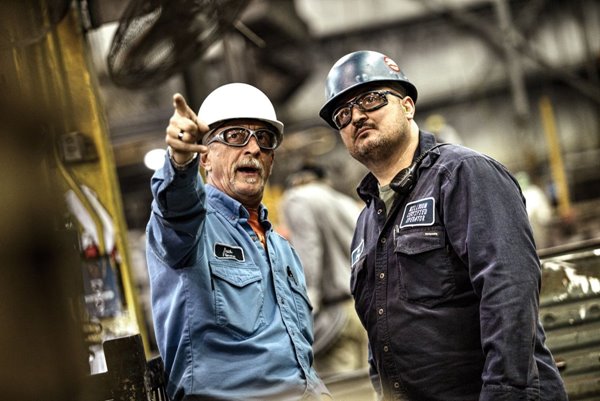As sales grew, Lause needed a manufacturer. But affordable help wasn’t available to mass produce hand-knitted hats in the U.S., and there wasn’t yet a machine capable of handling the Peekaboos design.
Lause tried using knitters in South America and Europe, but it didn’t work out. She finally found people to make the hats in China, and that lasted about three years.
The quality, however, was inconsistent. Hats would vary in size, and some weren’t good enough to ship to customers. Lause said she couldn’t be certain the knitters in China received a fair wage and were treated well by the contractor she used. That made her uncomfortable.
“They would send me photos and videos, but it never really felt right,” she said.
Lause sought to gain more control over production.
“The reason I got into this was I liked making things, and if I was going to put something out into the world, I wanted to know that integrity was behind it,” she said.
Lause was told again and again that the process was too difficult to automate. Instead of giving up, she and an engineer from a knitting-machine company in New Jersey spent nearly two years searching for a solution. The one-ton 3-D knitting machine and software they developed cost $80,000 and could handle the hats’ patented ponytail feature as if it was knitted by hand.
Now, Lause, a self-described “recovering perfectionist,” has three of the machines in a Germantown shop where she and a handful of employees produce the hats sold on the company’s website.
“I felt like the luckiest girl for being able to have this in my four walls, to make this product at the level of integrity I wanted and needed,” she said.
Other, larger companies, have found a hybrid model of reshoring works for them — bringing some products home, leaving some abroad.
Around 20 years ago, Metal Ware Corp., the Wisconsin-based maker of the legendary Nesco Roaster and other household goods, closed its factory in Algoma and moved the work to China.
Many companies across the state and nation went down a similar path. With low-cost labor and subsidized industries, China seemed unstoppable in its quest to become the factory of the world. Manufacturers in the U.S. were at a huge disadvantage, Metal Ware owner Wes Drumm told the Milwaukee Journal Sentinel in 2003.
For cost reasons, the Nesco Roaster continues to be made in China. However, century-old Metal Ware has returned other manufacturing to northeast Wisconsin.
“We’re probably the main company around here that’s reshored. It feels extremely good because I grew up in this community...went away for years, and when I first came back, everything had left,” said CEO Rick Carey.
The question now is to what degree consumers are willing to pay for made-in-America goods.
The Boy Scouts of America dropped Metal Ware as the manufacturer of its camping cookware kit and instead sent the work to China. Metal Ware made the kit for many years and said it never had a complaint.
"I was absolutely flabbergasted," Carey said. "If the Boy Scouts of America don't assign the value to an American-made product, how can we expect any consumer to?"
China is still the factory of the world. But this is an opening.
With all the reshoring taking place with U.S. companies large and small, China is still considered the factory of the world — a title it's not likely to relinquish. And some U.S. companies are still moving work there, or at the least, aren't pulling it back.
However, U.S. new investment in China during the first half of 2023 was down 31% from 2022, according to Grace Wang, an economics professor at Marquette University. Also, China has lost work to Vietnam, Thailand, Mexico, and other low-cost countries.
Chinese manufacturers face significant new challenges, including rising wages.
"In 2023, the average manufacturing wage in China was more than three times that in Vietnam. These wage differentials suggest China is gradually losing its competitive advantage in industries that rely on labor-intensive processes, such as household items or sporting goods. As a result, countries like Vietnam are becoming more attractive for foreign investment in such industries," Wang said.
Just as Americans struggled when factories left their communities years ago, many young people in China cannot find work.
"Given the labor market situation, factory closures can have quite a negative impact on workers. The loss of income is, of course, the most visible impact. However, the result of factory shutdowns can be more profound, especially in an environment with a relatively high unemployment rate," Wang said.
Reshoring could be enduring if the economics allow for it, but that's far from certain.


Bob Wahlin, CEO and president of Stoughton Trailers in Stoughton, Wisconsin.
Past attempts failed in favor of global trade and competitive advantages, UBS Investment Research said in its 2023 Made in America report. "Any potential resurgence of American manufacturing will take years and face labor constraints, alongside other challenges such as the often-lengthy process of regulatory review."
Nationwide, a skills gap is a threat to reshoring. Unabated, it’s expected to leave around 1.9 million jobs unfilled by 2033, according to Deloitte Consulting and The Manufacturing Institute.
The largest barrier to having a stronger workforce is recruiting enough trainees.
A “massive shift” in resources is needed from liberal arts college degrees to engineering and apprentice programs, says Moser with Reshoring Initiative. “Aggressive action is needed now to increase the quantity and productivity of our workforce,” he said.
Stoughton Trailers, again, will be a company to watch. In Evansville, it produced a steady stream of intermodal trailer chassis until the early 2000s when Chinese manufacturers entered the market, said Wahlin, the company president.
“That part of our business went down to zero,” he said, adding the Evansville plant was closed for several years until it could start making other products. “The chassis line was shut down and a bunch of equipment was collecting dust in a dark factory. It was heartbreaking for the business and the community. A lot of people lost their jobs.”
A worker puts decals on a nearly finished intermodal container chassis trailer Tuesday, April 25, 2023 at Stoughton Trailers in Stoughton, Wis.
Ultimately, three Chinese companies controlled more than 86% of the world's supply of intermodal chassis, and those same companies built more than 95% of the containers those trailers hauled, according to a report from U.S. Federal Maritime Commissioner Carl Bentzel in 2020.
One Chinese manufacturer in particular was selling heavily subsidized trailers for less than the cost of the steel in the frame, the coalition of U.S. companies claimed in their trade violation complaint. “Our primary foreign competitor has long been one of China’s prized state-owned enterprises,” Wahlin said.
The Chinese manufacturers — and, notably, some in the U.S. transportation industry — viewed the dispute much differently. They said coalition members had only themselves to blame for not responding to changes in the marketplace, and for not investing in new designs and factory automation.
Some U.S. freight handlers said the Chinese were a more reliable source of intermodal chassis.
"We have this time to rebuild ... It’s our responsibility to be sure we’re ready to compete globally." -Bob Wahlin, president of Stoughton Trailers
“When our members try to purchase chassis from the (five U.S.) companies, they often fail to deliver,” the Harbor Trucking Association said in a U.S. International Trade Commission hearing.
Track Intermodal, based in Princeton, New Jersey, agreed.
“We do not import chassis from China and elsewhere because they are cheaper as a result of dumping or subsidies. We import because we have to. We have no choice,” testified Val Thomas Noel, the company's chief operating officer.
Some have argued that the cost of the tariffs, in higher chassis prices, will eventually be borne by American consumers in higher prices for products that travel by truck, which is nearly everything. The countervailing duty and anti-dumping order, plus another tariff already in place, more than tripled the price of a $12,000 Chinese chassis.
Workers finish contructing an intermodal container chassis trailer at Stoughton Trailers in Stoughton, Wis. A Chinese competitor of Stoughton Trailers illegally flooded the United States with products at below-market prices, for less than waht Stoughton paid for the raw materials.
After the ruling, Stoughton Trailers grabbed market share and ramped up production. So many new hires were needed, it recruited hundreds of people from Colombia, Nicaragua, Mexico, and Puerto Rico for jobs with a starting wage of around $20 an hour.
The company, now with more than 1,600 employees, opened a factory in Waco, Texas, and is building a new headquarters on the corner of Highway 51 and County Road B in the City of Stoughton, replacing the headquarters it's had in an old industrial building since 1966.
The trade-dispute ruling is subject to review in 2026, at which time the tariffs on Chinese-made trailers could be dismissed.
“We have this time to rebuild that business,” Wahlin said. “It’s our responsibility to be sure we’re ready to compete globally."


